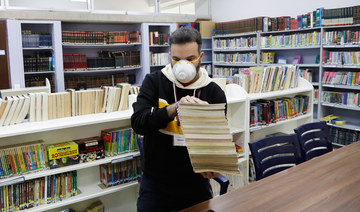BEIRUT: Campaigners in Lebanon will gather at Beirut’s Press Club on Wednesday morning to unveil a petition that calls on the UN to create an international commission to investigate and prevent political corruption. It has been signed by number of former ministers, former and current MPs, representatives of non-governmental organizations, and intellectuals.
Toni Nissi, the president of the International Lebanese Committee for UN Security Council Resolution 1559, a pro-democracy NGO, said that there have been many attempts by campaigners to clean up politics in Lebanon over the years, including lobbying for international resolutions to be issued and implemented.
“We have always been pursuing their implementation, including UNSCR 1559,” he said, referring to the UN resolution, adopted in 2004, that backed “free and fair elections” and called for “all remaining foreign forces to withdraw from Lebanon” and “for the disbanding and disarmament of all Lebanese and non-Lebanese militias.”
Nissi continued: “But now, with the ongoing revolution, and after Lebanon became a failed state and after the successful examples of Guatemala and other countries, we are finally able to take another step toward our goals.”
He dismissed any suggestion of a connection between the economic crisis in Lebanon and the sanctions imposed by US President Donald Trump on individuals linked to Hezbollah.
“The crisis is due to the high levels of corruption and the lack of leadership skills among Lebanese politicians,” said Nissi, “It is impossible to have a stable economy when the public sector supplies 65 percent of the jobs. How can the taxes paid by the 35 percent working in the private sector be able to pay the salaries of the 65 percent plus all the country’s expenses, with all the ongoing corruption?”
Given that politicians from the governing parties continue to exert full control over the implementation of laws in Lebanon, and rarely commit to the implementation of UN resolutions and decisions, including UNSCR 1559, some might be skeptical about the chances of the petition having any significant effect. Nissi, however, remains hopeful that it will bring about change, because the commission would be set up directly through the UN without interference from the Lebanese administration.
“Political reform is a must,” he said. “But to reach political reform we must stop the corruption first, get back the stolen money, eliminate any factors that protect the thieves, and achieve enforcement of the law. We believe that if the petition’s requests are implemented, we might reach that phase.”
In the petition, the signatories urge UN Secretary General Antonio Guterres to help the Lebanese people by restoring the transparency and correct functioning of government by creating a commission to investigate the presence of illicit security forces and clandestine organizations that commit crimes that damage people’s human rights. It also also requests that the commission help to identify illegal groups, including links between state officials and organized crime, their activities, modes of operation and financing sources.
The commission would also appoint qualified individuals to support the attorney general’s efforts to investigate and prosecute people involved in illegitimate groups. It would recommend new public policies and procedures designed to eliminate such groups and strengthen the state’s ability to ensure basic human rights for its citizens
Highlighting the roles of UN commissions set up to tackle corruption in Guatemala, Honduras and El Salvador, the signatories asked Guterres to take action to help investigate all acts of corruption, abuse of power, violations of human rights and illicit enrichment in Lebanon. They also hope the commission can help bring charges against individuals and groups found to have committed crimes, acts of corruption or any other illegal action, by providing experienced investigators, prosecutors, and forensic, IT, environmental, educational, financial and other experts to assist the attorney general.
















